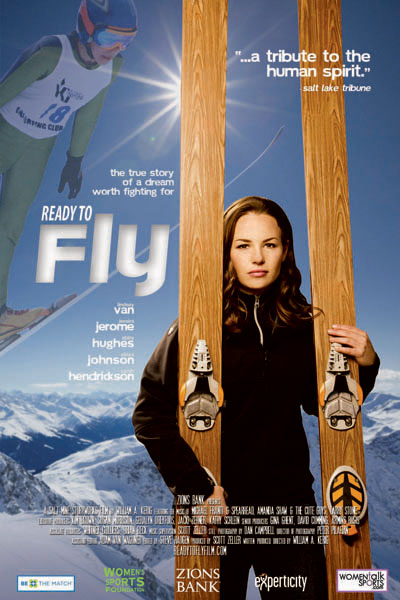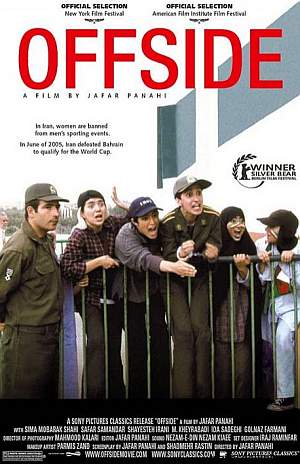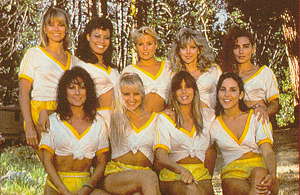★★
“A two-year round-the-world voyage. Filmed, apparently, in real time.”
 What were you doing when you were 14? Going to school. Hanging out with friends. Being highly irritated by your parents. That’s probably fairly close. I’m quite sure the answer isn’t “spending two years sailing around the world by yourself.” Which would be Laura Dekker’s answer. The film chronicles her single-handed sailing expedition, as well as the path of her life which led her to the epic voyage, and the battle against the Dutch government, who considered the trip dangerous, and wanted to remove Laura from parental custody as a result. [That aspect reminded me of Ready to Fly, where the women ski-jumpers also had to go to court as part of their battle for acceptance]
What were you doing when you were 14? Going to school. Hanging out with friends. Being highly irritated by your parents. That’s probably fairly close. I’m quite sure the answer isn’t “spending two years sailing around the world by yourself.” Which would be Laura Dekker’s answer. The film chronicles her single-handed sailing expedition, as well as the path of her life which led her to the epic voyage, and the battle against the Dutch government, who considered the trip dangerous, and wanted to remove Laura from parental custody as a result. [That aspect reminded me of Ready to Fly, where the women ski-jumpers also had to go to court as part of their battle for acceptance]
The bulk, however, is about the trip itself, with the on-board footage all filmed by Dekker herself, for obvious reasons connected to the word “single-handed” – fortunately, my fears of sub-Blair Witch shakycam proved unfounded. The main problem is the almost complete lack of any drama here. Maybe there’s more if you are a sailing enthusiast, but about as exciting as it gets, is a bit of rough weather and a bird that takes refuge on the deck. The only narrative tension is Laura’s decision to switch from sailing under the Dutch flag to that of the country where she was born (on a boat), New Zealand. I appreciate that you can’t manufacture drama where none happened, but this seems less like the taxing and potentially lethal endeavour it would seem to be, and more like a jaunt around a village pond on a slightly-overcast Saturday afternoon. One bit of ocean blends into another, and perhaps the most interesting parts are during Dekker’s sometimes lengthy stopovers en route, where she explores the local landscape.
Dekker herself generally comes over as remarkably mature for her age – 14 when she started, 16 by the time she completed the circumnavigation – albeit occasionally a bit bratty. That’s perhaps exacerbated by her basically fending for herself for two years, though if you’ve raised a teenage girl, you’ll know that’s pretty much par for the course, and any self-centredness is backed by an ability to handle whatever the world throws at her, well in excess of that possessed by a normal adolescent. However, nor is there much sense of character development, and you don’t get any sense the Laura you see at the end was changed in any significant way by her experience. The film definitely needs to dig deeper into what makes Dekker tick, and the apparent failure to do so, leaves it as not much more than a shallow, if pretty, travelogue. The heroine deserves a bit better.
Dir: Jillian Schlesinger
Star: Laura Dekker






 Being an action heroine is a rebellious, possibly revolutionary, act against society: what counts, depends entirely on how your society views women. Going to a soccer game, for example, would not qualify you in the Western world – but as in Ancient Greece, sporting events in Iran are strictly male-only, and a woman who attends one and gets caught, will find herself handed over to the Vice Squad. It redefines requirements somewhat, to say the least. The film tells the story of a number of women, who dress as men to sneak into a crucial 2005 World Cup qualifier between Iran and Bahrain, only to find their disguises imperfect. They’re held in an area, just out of sight of the game, by a group of soldiers, who really have better things to do themselves.
Being an action heroine is a rebellious, possibly revolutionary, act against society: what counts, depends entirely on how your society views women. Going to a soccer game, for example, would not qualify you in the Western world – but as in Ancient Greece, sporting events in Iran are strictly male-only, and a woman who attends one and gets caught, will find herself handed over to the Vice Squad. It redefines requirements somewhat, to say the least. The film tells the story of a number of women, who dress as men to sneak into a crucial 2005 World Cup qualifier between Iran and Bahrain, only to find their disguises imperfect. They’re held in an area, just out of sight of the game, by a group of soldiers, who really have better things to do themselves. Particularly outstanding is Irani’s tomboy, who becomes the de facto leader of the group, and continually hassles the guards. The film has a surprising amount of straight-faced humour, such as her riposte when asked if she’s a boy or a girl: “Which do you prefer?” Or one girl’s response when told they can’t go in because the men will be cursing: “We promise not to listen.” Similarly, when another needs to use the bathroom, this poses problems, since naturally there are no women’s facilities. The solution involves the impromptu conversion of a poster into a mask, though this hardly resolves things. Obviously, it’s not a traditional genre piece, and it’s this
Particularly outstanding is Irani’s tomboy, who becomes the de facto leader of the group, and continually hassles the guards. The film has a surprising amount of straight-faced humour, such as her riposte when asked if she’s a boy or a girl: “Which do you prefer?” Or one girl’s response when told they can’t go in because the men will be cursing: “We promise not to listen.” Similarly, when another needs to use the bathroom, this poses problems, since naturally there are no women’s facilities. The solution involves the impromptu conversion of a poster into a mask, though this hardly resolves things. Obviously, it’s not a traditional genre piece, and it’s this  The marketeers screwed up: aimed at teenage girls, our daughter refused to see it, on the grounds – Hollywood, please note – that their bikini tops and bottoms didn’t match in the poster… Anyway: Anne Marie (Bosworth) sees her ticket to stardom in a surf competition on Hawaii’s North Shore. But she has to come to terms with waves bigger than she’s ever faced before; a rebellious kid sister (Boorem); a dreadful job as a hotel maid; and, inevitably, the guy who wants to spend quality time with her on dry land (Davis), while her friend Eden (Rodriguez) tries to keep her focussed on surfing.
The marketeers screwed up: aimed at teenage girls, our daughter refused to see it, on the grounds – Hollywood, please note – that their bikini tops and bottoms didn’t match in the poster… Anyway: Anne Marie (Bosworth) sees her ticket to stardom in a surf competition on Hawaii’s North Shore. But she has to come to terms with waves bigger than she’s ever faced before; a rebellious kid sister (Boorem); a dreadful job as a hotel maid; and, inevitably, the guy who wants to spend quality time with her on dry land (Davis), while her friend Eden (Rodriguez) tries to keep her focussed on surfing. I guess Blood Sport was already taken? It’s softball beauties vs. rednecks after: a) the visiting ladies thump the home side 17-2, b) the team owner has to extract his fee at gunpoint, and c) the gals resist – forceably – the crude advances of the locals. Before you can say, “duelling banjos”, they’re being pursued through the woods, and picked off one by one.
I guess Blood Sport was already taken? It’s softball beauties vs. rednecks after: a) the visiting ladies thump the home side 17-2, b) the team owner has to extract his fee at gunpoint, and c) the gals resist – forceably – the crude advances of the locals. Before you can say, “duelling banjos”, they’re being pursued through the woods, and picked off one by one. Playing Babe, daughter of team owner Ross Hagen, Laura Albert is about the only one of the girls to make any impression as a character; she’d go on to become a stuntwoman, working on the like of Starship Troopers. The rest of her colleagues take showers, get assaulted (a sequence verging on the nastily gratuitous), die, turn psycho and take revenge, all without exhibiting any significant personality traits. Quite an achievement in itself. Another one of those movies which will put you off going to rural, Southern parts of America.
Playing Babe, daughter of team owner Ross Hagen, Laura Albert is about the only one of the girls to make any impression as a character; she’d go on to become a stuntwoman, working on the like of Starship Troopers. The rest of her colleagues take showers, get assaulted (a sequence verging on the nastily gratuitous), die, turn psycho and take revenge, all without exhibiting any significant personality traits. Quite an achievement in itself. Another one of those movies which will put you off going to rural, Southern parts of America.